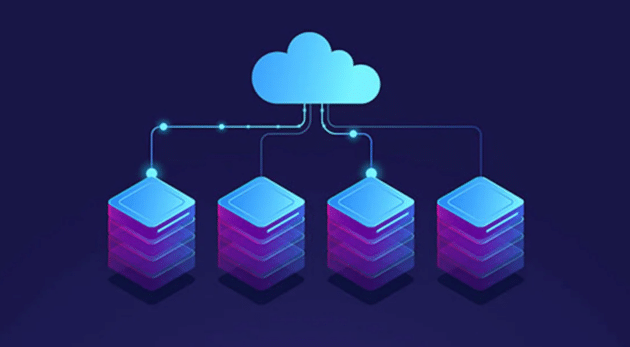Cloud Backup Servers – Data is the lifeblood of modern businesses, making data protection a top priority for organizations of all sizes. One of the most effective solutions for safeguarding critical data is leveraging a cloud backup server. This article explores the ins and outs of cloud backup servers, their benefits, key features, and how to choose the right solution for your needs.

What Is a Cloud Backup Server?
A cloud backup server is a virtual storage solution hosted in the cloud that enables users to back up their data securely. Unlike traditional on-premises backup systems, cloud backup servers allow data to be stored remotely in a cloud provider’s infrastructure, ensuring accessibility, scalability, and enhanced data protection.
Organizations use cloud backup servers to safeguard against data loss due to hardware failures, cyberattacks, accidental deletions, or natural disasters. Automating the backup process allows businesses to maintain business continuity and adhere to compliance requirements with minimal manual intervention.
How Does a Cloud Backup Server Work?
Cloud backup servers operate using a simple yet robust process:
- Data Selection
Users or administrators select the data, files, or systems they want to back up. This can include everything from documents and databases to entire virtual machines. - Encryption and Compression
Before the data is transmitted to the cloud, it is encrypted to ensure security and compressed to optimize storage usage. - Data Transfer
The data is transmitted over the internet to the cloud backup server. Most solutions use secure protocols to prevent interception during transfer. - Storage in the Cloud
The backup data is stored on the cloud server. Most providers replicate the data across multiple data centers for redundancy. - Recovery On-Demand
In data loss or corruption, users can retrieve their backups from the cloud, restoring data to its original state.
Benefits of Using a Cloud Backup Server
Adopting a cloud backup server offers a range of advantages that make it a compelling choice for businesses and individuals alike.
- Scalability
Cloud backup servers can quickly scale with your storage needs, allowing you to expand or reduce capacity without significant infrastructure changes.
- Cost-Effectiveness
With a pay-as-you-go pricing model, cloud backups eliminate the need for expensive on-premises hardware and maintenance costs.
- Data Security
Advanced encryption, multi-factor authentication, and data replication ensure your backups remain secure and accessible.
- Automated Backups
Cloud solutions often include automated backup scheduling, reducing the risk of human error and ensuring data is backed up regularly.
- Disaster Recovery
Cloud backups provide a robust disaster recovery plan, enabling quick data restoration from any location in case of emergencies.
- Global Accessibility
Cloud backup servers can be accessed from anywhere with an internet connection, making them ideal for remote work environments.
Key Features of Cloud Backup Servers
When evaluating cloud backup solutions, it’s essential to consider the following features:
- Incremental Backups
After the initial full Backup, incremental backups save only changes made to files, reducing storage usage and speeding up backup processes.
- Versioning
This feature retains multiple versions of files, enabling users to restore previous versions if necessary.
- Deduplication
By identifying and eliminating duplicate data, deduplication minimizes storage consumption and optimizes backup efficiency.
- Encryption
End-to-end encryption ensures that data is protected both during transmission and at rest in the cloud.
- Centralized Management
A user-friendly dashboard or control panel simplifies monitoring, configuring, and managing backup processes.
- Compliance Support
Many providers offer solutions that comply with regulatory standards like GDPR, HIPAA, or ISO 27001, which are crucial for businesses handling sensitive data.
Everyday Use Cases for Cloud Backup Servers
- Small and Medium Businesses (SMBs)
SMBs often lack the resources to manage complex on-premises backup solutions. Cloud backup servers provide an affordable and reliable alternative.
- Enterprise-Level Data Protection
Enterprises benefit from cloud backups’ scalability and robust security features to manage large-scale data across multiple locations.
- Remote Work and BYOD Policies
With more employees working remotely or using personal devices, cloud backups ensure data protection across diverse endpoints.
- Disaster Recovery Planning
Organizations use cloud backups to create disaster recovery strategies, ensuring business continuity during outages or cyberattacks.
Challenges of Cloud Backup Servers
While cloud backup servers offer numerous benefits, there are some challenges to consider:
- Internet Dependency
Reliable internet connectivity is essential for uploading and retrieving backup data, which can be a limitation in remote areas.
- Data Transfer Speeds
Large-scale backups can consume significant bandwidth and time, especially during the initial upload.
- Costs Over Time
While cost-effective initially, long-term cloud storage can become expensive, especially for businesses with large datasets.
- Compliance Risks
Misconfigured backups or reliance on non-compliant providers can lead to regulatory penalties.
How to Choose the Right Cloud Backup Server
Selecting the ideal cloud backup solution requires careful consideration of your specific needs. Here are some factors to evaluate:
- Provider Reputation
Choose a provider with a strong reliability, security, and customer support track record.
- Storage Capacity and Scalability
Ensure the solution can accommodate your current and future storage requirements.
- Data Security Measures
Verify that the provider offers robust encryption, access controls, and compliance with relevant regulations.
- Cost and Pricing Model
Compare pricing plans and ensure cost transparency, including data retrieval or transfer fees.
- Ease of Use
Look for solutions with intuitive interfaces and straightforward setup processes.
- Integration Capabilities
Ensure the backup solution integrates seamlessly with your existing systems and applications.
Popular Cloud Backup Server Providers
Several reputable providers dominate the cloud backup market, offering various features and pricing plans:
- Amazon Web Services (AWS) Backup
Comprehensive backup solution supporting diverse AWS services and hybrid environments.
- Microsoft Azure Backup
Scalable solution with integration into the Azure ecosystem and pay-as-you-go pricing.
- Google Cloud Backup and Disaster Recovery
Offers robust, AI-driven features with a focus on data protection and recovery.
- Backblaze
Known for its simplicity and affordability, especially for SMBs.
- Acronis Cyber Backup
Combines cloud backup with cybersecurity features for enhanced protection.
Future Trends in Cloud Backup Servers
As technology evolves, cloud backup solutions are expected to become even more advanced. Emerging trends include:
- AI and Machine Learning
AI-powered solutions will optimize backup schedules, identify anomalies, and improve disaster recovery times.
- Edge Computing Integration
Edge computing will enable faster backups and lower latency by processing data closer to its source.
- Sustainability Initiatives
Providers will adopt greener data centers and energy-efficient practices, appealing to eco-conscious businesses.
- Zero-Trust Architecture
Enhanced security frameworks will enforce strict authentication and data protection policies.
Conclusion
A cloud backup server is vital for protecting data in today’s digital landscape. Businesses can make informed decisions about their backup strategies by understanding their benefits, features, and challenges. Whether an SMB seeking an affordable solution or an enterprise requiring robust disaster recovery, a well-chosen cloud backup server ensures your data remains secure, accessible, and resilient in the face of evolving threats.

